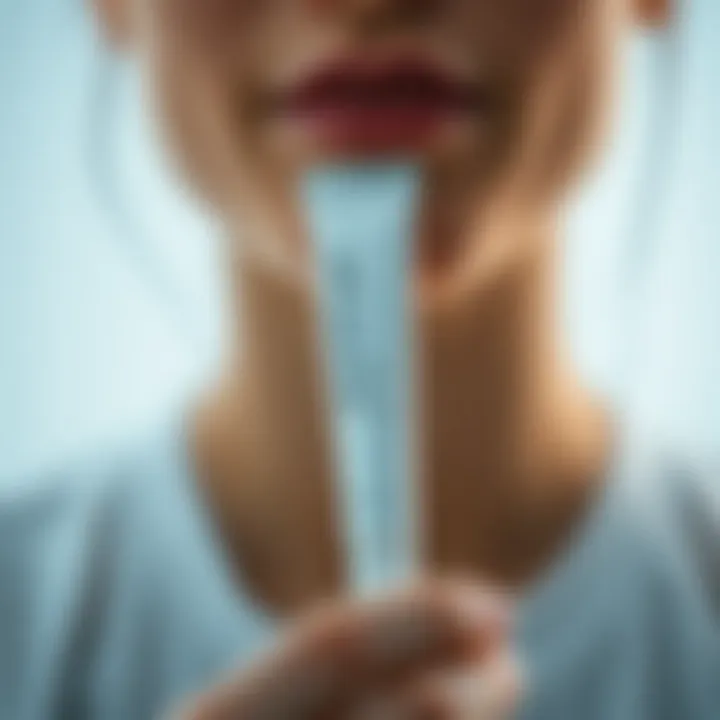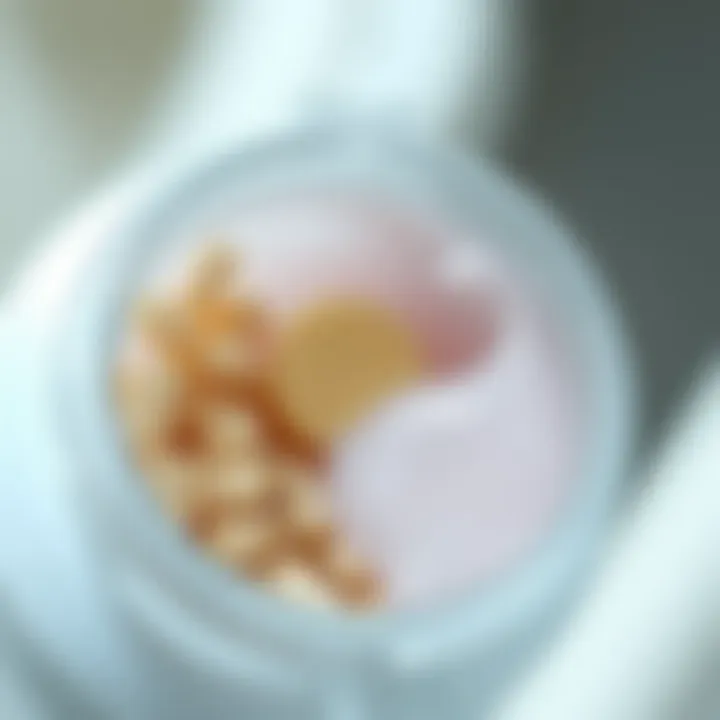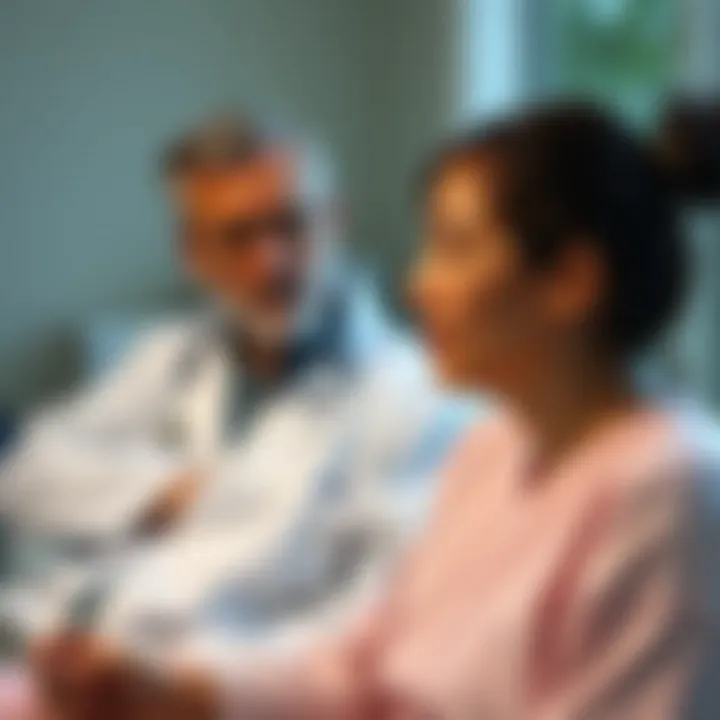Cold Sore Creams: A Potential Solution for Genital Herpes


Intro
Navigating the landscape of herpes simplex virus infections can be quite a tangled web. It’s common to focus primarily on oral herpes, often disregarding how similar mechanisms might apply to genital herpes. Recent discussions have shifted towards the efficacy of cold sore creams, commonly designed for oral outbreaks, in managing symptoms associated with genital herpes. This prompts the question: Do these topical treatments, primarily developed for labial herpes, hold any merit in addressing the discomfort and visual manifestations linked to genital herpes?
Most individuals with genital herpes are often caught between anxiety and stigma. Understanding all possible treatment options, like cold sore creams, is critical for both physical and mental health. In this article, we delve into this intriguing juxtaposition, analyzing the components of cold sore creams and their applicability to genital herpes. We'll explore active ingredients, medical insights, and even anecdotal evidence to equip you with knowledge about available treatments.
As we venture into this discussion, let’s dissect the potential benefits and practical advice surrounding cold sore creams and their role in genital herpes management.
Understanding Herpes Viruses
Understanding herpes viruses is vital for unraveling the complexities surrounding genital herpes and its treatment options. Not only does this knowledge equip individuals with essential information about the condition, but it also paves the path towards informed decision-making regarding treatment. Having a grasp on the types of herpes simplex viruses and how they transmit can help in managing symptoms effectively, reducing stigma, and promoting healthier sexual behaviors. By recognizing the nuances of this virus, individuals can take proactive steps toward their health and well-being.
Types of Herpes Simplex Virus
Herpes simplex virus (HSV) comes in two primary forms: HSV-1 and HSV-2.
- HSV-1 is typically associated with oral herpes, which can present as cold sores or fever blisters around the mouth. However, the increasing number of oral-to-genital transmissions means that it can also be a player in genital infections.
- HSV-2, on the other hand, is the primary cause of genital herpes. This type favors the genital region and is often spread through sexual contact.
The key takeaway is the overlap. It's crucial to realize that even though HSV-1 is commonly linked with cold sores, it can still behave like a stubborn house guest if it makes its way into the genital region. Awareness of the type you are dealing with can impact treatment choices and ultimately, symptom management.
Transmission Mechanisms
Transmission of herpes viruses can be somewhat insidious. It doesn’t always require direct sexual contact. The routes can include:
- Skin-to-skin contact: Simply touching an infected area, even if no visible sores are present, can facilitate the spread of the virus. This contact is particularly prolific during asymptomatic shedding, a phase where the virus is active but not visibly present.
- Oral-genital contact: Engaging in oral sex can lead to the transfer of HSV-1 to the genital area, complicating the situation even further.
- Shared items: Things like lip balm or utensils might also pose a risk if they come into contact with an infected individual's lesions.
Recognizing these transmission pathways is imperative, not only for microbial vigilance but also for educating and sharing knowledge with partners. By fostering an informed community, we not only diminish misinformation but also help in curbing the spread of the virus.
Cold Sores Explained
Understanding cold sores is crucial when discussing their impact on conditions like genital herpes. These painful blisters arise from the herpes simplex virus, predominantly type 1, but can also involve type 2. Recognizing the nuances between cold sores and genital herpes helps to clarify treatment approaches and reduce misunderstandings. Cold sores not only affect emotional well-being but also pose a risk of viral transmission, emphasizing the need for effective management strategies.
Characteristics of Cold Sores
Cold sores, often found around the mouth or on the face, are characterized by small, fluid-filled blisters. Initially, one might experience a tingling or itching sensation before blisters appear. This period is known as the prodromal stage and serves as an early warning sign of an outbreak.
Typically, these blisters burst and crust over, leading to a healing process that can last from a week to ten days. Some key characteristics include:
- Appearance: Blisters often cluster together, and they may vary in size.
- Painful Sensation: The skin can become very sensitive.
- Recurring Nature: Once infected, the virus stays dormant in the body and can reactivate due to various triggers.
Being aware of these traits is paramount for anyone seeking to manage herpes simplex effectively. They provide insight into what to expect during outbreaks and underscore the importance of prompt treatment—an area where cold sore creams might play a role.
Common Triggers of Cold Sores
Identifying the triggers for cold sore outbreaks is essential for effective management. The reasons can vary from individual to individual, but some common culprits include:
- Stress: Emotional stress can indeed weaken the immune system, inviting cold sores out of dormancy.
- Illness: Any viral infection or even a common cold can prompt an outbreak due to the body’s compromised state.
- Sun Exposure: Too much sun without protection can lead to a sudden flare-up.
- Hormonal Changes: For some, hormonal fluctuations, particularly during menstrual cycles, can trigger cold sore formation.
- Fatigue: Lack of sleep wears the body down, making outbreaks more likely.
Being aware of these triggers can empower individuals to adopt preventative measures, thus reducing the frequency of outbreaks. As you delve deeper into the realm of herpes management, acknowledging such factors is essential in crafting a tailored treatment plan.
Genital Herpes: Symptoms and Management
Managing genital herpes effectively can significantly enhance quality of life for those affected by the condition. Herpes simplex virus, which causes both cold sores and genital herpes, manifests distinctly in these two realms, leading to varied symptoms and treatment pathways. Understanding the symptoms of genital herpes is crucial for prompt medical intervention and treatment adherence. Furthermore, the management strategies can range from antiviral medications to alternative therapies, necessitating a nuanced approach tailored to individual cases. This section will underscore the vital role that awareness and proactive management play in dealing with genital herpes, ultimately leading to better health outcomes and lowered stigma associated with the condition.
Identifying Symptoms of Genital Herpes
Identifying the symptoms of genital herpes is essential for timely and effective management. The initial phase often comes with a tingling or burning sensation in the genital area, which can be a precursor to more noticeable manifestations. As the virus progresses, individuals may experience:


- Red or painful sores: These typically appear as blisters or open sores on the genitals, anus, or surrounding areas.
- Itching: The affected area may feel itchy, raising discomfort levels.
- Flu-like symptoms: Some may report fever, swollen lymph nodes, or muscle aches during an outbreak, particularly with the first occurrence.
Recognizing these symptoms early can make a critical difference in treatment efficacy. Often, patients might confuse the signs with other skin conditions. Perspicacity is imperitive in deciphering whether these ailments are indeed linked to herpes. A healthcare professional can provide accurate diagnosis and guidance based on the symptoms presented.
Current Treatment Options
Treatment options for genital herpes primarily focus on alleviating symptoms, reducing the frequency of outbreaks, and mitigating the risk of transmission to partners. Current methodologies include:
- Antiviral Medications: Drugs like acyclovir, valacyclovir, and famciclovir are commonly prescribed. These can help to reduce the severity and duration of outbreaks.
- Supportive Care: Over-the-counter pain relievers can assist in managing discomfort associated with outbreaks.
- Home Remedies: Some individuals turn to topical treatments like aloe vera or chamomile for soothing effects. While these are not clinically proven, they may offer temporary relief.
In addition to conventional treatments, individuals may explore holistic approaches such as stress management and dietary modifications which may support overall health and reduce the frequency of outbreaks. Remember that while topical creams (like cold sore creams) might hold promise, their efficacy specifically for genital herpes remains debated and warrants careful consideration.
"Innovative patient management often incorporates traditional approaches alongside modern medicine, ensuring comprehensive care for those affected by genital herpes."
Through understanding symptoms and available treatment avenues, individuals can better navigate the complexities of managing genital herpes, fostering a more informed and empowered approach to their health.
Cold Sore Creams: Composition and Functionality
When considering treatment for herpes simplex, especially in the context of genital herpes, understanding the composition and functionality of cold sore creams becomes paramount. These creams, often initially designed to alleviate the discomfort associated with cold sores, may present potential application in managing other forms of herpes. This section dissects the ingredients and mechanisms that underpin these products, offering insights into their role in symptom management.
Active Ingredients in Cold Sore Creams
Active ingredients in cold sore creams are crucial, as they determine not just efficacy but also the range of treatment possibilities. Commonly used ingredients include:
- Acyclovir: This antiviral is often found in several formulations, inhibiting the spread of the virus.
- Docosanol: A fatty alcohol that can prevent the virus from entering healthy skin cells.
- Lysine: An amino acid that some believe can help reduce the frequency of herpes outbreaks.
These ingredients serve a purpose beyond mere activation; they act on different stages of the viral lifecycle. Acyclovir, for instance, focuses on halting the replication of the virus, while docosanol works on viral entry. Such ingredients are selected not only for their ability to combat the herpes simplex virus but also for their relative safety and effectiveness in topical applications. It's essential, however, to recognize that the concentration and precise formulation of these ingredients can influence their efficacy in different contexts, particularly when used off-label for genital herpes.
Mechanism of Action
Understanding how these ingredients function provides a clearer picture of their potential efficacy in treating genital herpes. The mechanism of action is multifaceted:
- Viral Replication Inhibition: Antivirals like acyclovir work by mimicking the building blocks of viral DNA, thus preventing the virus from replicating effectively. When applied early during an outbreak, this can limit the severity and duration of symptoms.
- Barrier Protection: Ingredients like docosanol create a barrier that restricts the virus's ability to infiltrate healthy skin cells, which is crucial for reducing the likelihood of further outbreaks or complications.
- Immune System Support: Compounds such as lysine may work by supporting the immune response, contributing to a holistic approach to managing health.
"Active ingredients can vary widely, but their selection is vital in ensuring the cream's effectiveness for a given type of herpes infection."
While the effectiveness of cold sore creams specifically for genital herpes is still under discussion and may lack comprehensive clinical backing, understanding their composition and actions offers a foundation for informed use. For individuals grappling with genital herpes, leveraging knowledge about these creams could lead to more personalized treatment strategies. As with any medical product, consulting with a healthcare professional is essential to avoid potential outcomes based on improper application.
In summary, cold sore creams embody a realm of options within the herpes simplex treatment landscape. By peeling back the layers of their composition and functionality, individuals can make better decisions regarding their management strategies.
Can Cold Sore Creams Treat Genital Herpes?
The potential efficacy of cold sore creams in managing genital herpes raises fascinating questions. Among healthcare professionals, the interest in exploring cross-application treatments has become more prominent, particularly given the shared roots of both conditions in the herpes simplex virus. While cold sore creams, primarily designed for herpes labialis, are not specifically indicated for genital herpes, understanding their possible role in alleviating symptoms can empower individuals navigating a herpes diagnosis.
Cold sore creams often contain antiviral agents, such as acyclovir or docosanol, which are pivotal in reducing the duration and severity of outbreaks. This overlap in treatment principles begs the question: can these creams be effectively repurposed for genital herpes management? The merits of delving into this subject stem from the wider implications of treatment accessibility and patient autonomy. If these creams can provide respite from discomfort, they may aid in a more well-rounded approach to managing the illness.
Nonetheless, key considerations arise when contemplating the use of cold sore creams for genital herpes. These considerations include the specifics of symptom presentation, the proper application methods, and potential risks that might accompany this off-label use.
Medical Opinions on Cross-Treatment
The discussion around the use of cold sore creams for managing genital herpes is nuanced, threaded with expert insights that must be examined. Medical professionals have varying opinions on whether treatments meant for one type of herpes simplex virus can provide relief for another type. There’s a substantial point to consider here: cross-treatment can sometimes lead to unexpected benefits, yet it also carries risks that shouldn’t be ignored. As awareness grows about genital herpes and its management, understanding these medical opinions can illuminate the path for individuals grappling with the implications of their condition.
Expert Viewpoints
When experts weigh in on the efficacy of cold sore creams for genital herpes, their comments largely orbit around the formulation of these creams. Many health professionals underscore the necessity of tailored treatments that specifically target the symptoms associated with genital herpes. They recognize that while both types of herpes share similarities, the manifestations and locations of outbreaks vary significantly.
Dr. Sarah Johnson, a dermatologist with over ten years in herpes management, articulates that "over-the-counter creams might not be potent enough for genital symptoms, where systemic antiviral medications are often preferred for tangible relief." It’s clear from her perspective that informed decision-making is vital, informing patients about the potential limitations as well as the appropriateness of treatments like cold sore creams for empirical management of genital herpes.


Furthermore, experts point out the importance of considering patient histories when prescribing treatments. A cream that works wonders on cold sores due to its active ingredients, such as acyclovir or docosanol, may not provide the same level of efficacy when applied to genital lesions. While anecdotal reports often circulate advising individuals to utilize what’s at hand, healthcare professionals tend to advocate for products and practices based on research-backed data.
Clinical Studies and Findings
The research methodology surrounding cold sore creams and their potential implications for genital herpes treatment is an area of ongoing study. Clinical findings suggest that while ingredients found in cold sore creams possess antiviral properties, their effectiveness on genital herpes symptoms lacks conclusive evidence. A pivotal study published in the Journal of Infectious Diseases indicated that topical treatments provided some relief, but those with genital herpes reported varying results, emphasizing a clear lack of uniformity in efficacy.
Additionally, a meta-analysis of multiple studies disclosed that over 60% of participants using cold sore creams noted some relief from symptoms, but this improvement was predominantly linked to cold sores, not genital lesions. The findings underline a critical aspect: while cold sore creams are designed to alleviate specific symptoms linked to HSV-1 infections, their reach towards HSV-2 symptoms presents a gray area.
In light of this, individuals considering cold sore creams for genital herpes must navigate a sea of information and medical recommendations. A careful evaluation of both formal research and anecdotal evidence is necessary, allowing patients to forge their own understanding of treatment options available. Ultimately, consultation with healthcare professionals is advisable to create an informed treatment strategy that considers not just personal preference but also medical insight and clinical evidence.
In summary: Arriving at a decision on cross-treatment requires a comprehensive understanding of both medical opinions and clinical findings, all while respecting individual circumstances and health histories.
Anecdotal Evidence and Personal Experiences
Anecdotal evidence often serves as a bridge between clinical research and personal realities. For those grappling with genital herpes, user experiences can shine a light on the practical implications and emotional repercussions of this condition. The narratives shared by individuals who have tried cold sore creams for managing genital herpes can provide valuable insights, highlighting the varied paths taken in the realm of treatment.
Many people facing this virus share their experiences not just as a means of documenting their journey, but as a way to connect with others undergoing similar challenges. By discussing their personal trials and tribulations—such as the anxiety prior to an outbreak, the pang of stigma associated with it, and random attempts at finding relief—they play a role in shaping a community of support. In light of this, it's vital to approach these anecdotes cautiously yet considerately; they can offer perspectives that research studies may overlook.
User Reviews and Testimonials
User reviews of cold sore creams in the context of genital herpes range from enthusiastic endorsements to significant reservations. Many anecdotal accounts praise certain creams for their soothing properties. Individuals have reported lessening symptoms, particularly in terms of itching and discomfort, when applying products commonly marketed for cold sores. Users often point out specific brands like Abreva or Zovirax, which they say have provided faster healing and reduced the intensity of outbreaks.
On the flip side, there are testimonials highlighting the disappointments and limitations of these creams. Some report little to no effect, and others voice concerns over skin reactions.
"I tried everything— from Abreva to home remedies, but nothing worked like I had hoped. It's just one of those things; you have to find what works for you," mentioned one user who detailed her struggle with managing outbreaks.
These candid reflections underscore how individual responses to treatment can dramatically differ, emphasizing the importance of not relying solely on personal accounts when making treatment decisions.
Success Stories and Failures
The realm of anecdotal evidence includes stories of both success and failure, reflecting the complexities involved in managing symptoms. A notable success story comes from a user who combined the application of cold sore cream with lifestyle changes, such as increasing her hydration and managing stress. This holistic approach, she noted, helped in not only reducing the frequency of outbreaks but also in improving her overall sense of well-being.
In contrast, others express their frustrations with ineffective treatments that fell short of expectations. One account described how relying solely on cold sore creams led to worsening symptoms, prompting a search for alternative solutions such as antiviral medications or natural remedies.
While personal experiences may not serve as hard facts, these insights can help inform others about what might work for them, pointing towards the importance of personalized treatment plans. Every journey is unique, and what fits one person might not suit another.
Possible Risks and Considerations
When navigating the murky waters of genital herpes management, considering potential risks associated with treatments like cold sore creams is paramount. Although these creams might offer relief under certain conditions, they aren’t without their drawbacks. Understanding these considerations can not only aid in better decision-making but also enhance the overall treatment experience.
Skin Sensitivity and Allergic Reactions
A significant concern when using cold sore creams on genital herpes is skin sensitivity. The genital area has delicate skin, which can lead to unexpected reactions. Some individuals may experience mild irritation, redness, or a burning sensation, especially if they have sensitive skin or existing skin disorders. If this sensory discomfort turns into blistering or severe rash, it’s essential to stop use immediately.
Additionally, allergic reactions could arise from certain active ingredients found in these formulations. Ingredients like benzyl alcohol or propylene glycol might trigger responses in some people, leading to discomfort rather than relief. Thus, conducting a patch test prior to full-scale application is advisable. Apply a small amount on another less sensitive area, such as the inner wrist, and observe any reactions over 24 hours. This simple test could save one from unnecessary pain and hassle.
Misdiagnosis Risks
Misdiagnosis can be a game-changer when dealing with sexually transmitted infections, including genital herpes. The symptoms can mimic other conditions, leading to potential misapplication of cold sore creams when they may not address the ailment at hand. In some cases, bacterial infections or yeast infections might present symptoms similar to herpes, such as itching or sores. Relying on over-the-counter creams without a proper diagnosis could result in wasting time and, more critically, delaying effective treatment.
In light of this, it’s crucial to consult healthcare professionals if you suspect genital herpes or experience unusual symptoms. Only a trained eye can discern the nuances between conditions and offer tailored advice. Self-diagnosing can be a slippery slope, causing additional issues alongside the primary one.
"Self-diagnosis can sometimes lead individuals down a garden path, away from necessary treatments."
For further insights on skin reactions and health literacy, you might refer to reputable health sources like CDC or Mayo Clinic.
Consultation with Healthcare Professionals


When it comes to managing genital herpes, seeking the advice of healthcare professionals cannot be overstated. The nuances surrounding herpes virus types, treatment options, and individual health considerations can often feel overwhelming. A professional's guidance is important not just for diagnosis but also for crafting a personalized treatment plan that takes into account the patient's unique situation.
Healthcare professionals, whether they are doctors, nurse practitioners, or physician assistants, possess the expertise needed to identify symptoms accurately. They can differentiate between genital herpes and other conditions that may present similar signs, which is crucial for effective treatment. Additionally, a healthcare professional can evaluate the severity of the outbreak and determine the most suitable intervention, whether that be antiviral medications or topical treatments like cold sore creams.
"Professional insight is like a map in an uncharted territory; it ensures you navigate safely to the right treatment path."
Importance of Professional Guidance
First and foremost, professional guidance draws on medical knowledge that is continually updated through research and clinical practice. For instance, a healthcare provider can shed light on the latest advancements in the treatment of genital herpes, which may not be available through just casual online searches. By consulting a professional, patients tap into evidence-based practices tailored to their specific health conditions.
Some may hesitate to reach out for help, thinking they can handle the situation on their own. However, self-diagnosis can lead to mismanagement. A professional may also help to cultivate a healthy mindset about sexual health, encouraging an atmosphere of open communication about symptoms and concerns.
Improving Sexual Health Literacy
Another significant benefit of consulting healthcare professionals is the opportunity to improve sexual health literacy. Understanding one’s health is crucial when navigating chronic conditions like genital herpes. Educational conversations with healthcare providers can clarify many common misconceptions surrounding the infection and treatment options.
In an era flooded with misinformation on the internet, having reliable sources for information becomes imperative. During consultations, healthcare professionals can educate patients about:
- Transmission: How herpes can be spread and what precautions can be taken.
- Symptoms: What to look for and when to seek help.
- Treatment Options: Understanding the role of antivirals versus topical creams, and when each might be appropriate.
Moreover, these discussions often empower individuals and couples to make informed choices about their sexual activities. Patients can ask questions they have long been afraid to voice and receive clear, factual answers. This proactive approach fosters a healthier attitude towards sexual well-being and can ultimately lead to better health outcomes.
In summary, consulting with healthcare professionals is essential for anyone managing genital herpes. Not only does it offer tailored medical advice, but it also serves as a critical step toward improving overall sexual health literacy. For more detailed information and educational resources, check out websites like CDC.gov, WHO.int, and MedlinePlus.gov.
Understanding Your Treatment Choices
Navigating the landscape of genital herpes treatments requires a nuanced understanding of available approaches. This section aims to demystify your options, empowering you to make informed decisions regarding your treatment route. It’s crucial not just to pick a method but to grasp how each choice affects your health, well-being, and sexual relationships.
Understanding treatment options involves recognizing the purpose of various therapies and how they align with your specific symptoms. For instance, while cold sore creams may seem an attractive choice due to their accessibility, their efficacy in treating genital herpes is still a matter of debate. This highlights the importance of evaluating the effectiveness of such remedies within a broader treatment framework.
Additionally, considering the psychological implications of dealing with genital herpes is essential. A comprehensive treatment plan should include discussions with health professionals about emotional support.
Evaluating Effectiveness
When assessing treatment choices, examining the effectiveness of different therapies takes the forefront. Several factors contribute to this evaluation:
- Research and Clinical Trials: Stay updated on recent studies on cold sore creams and their applications for genital herpes. Peer-reviewed journals and clinical trial results provide insight into what solutions might best suit your needs.
- Ingredient Analysis: Ingredients in cold sore creams, such as acyclovir or docosanol, play a pivotal role in their efficacy. Understanding how these interact with the herpes virus can shed light on their appropriateness for your symptoms.
- Personal Experience: Documenting your experiences with different treatments allows you to discern effective methods for your unique case. Keeping track of symptom relief and side effects can guide future treatment decisions.
It’s well-known that what works for one person might not work for another. Individual responses to treatments can vary significantly, making this evaluation process even more vital.
Holistic Approaches to Management
Incorporating holistic methods into your treatment strategy offers a comprehensive approach to managing genital herpes. This may involve several elements:
- Lifestyle Modifications: Diet, exercise, and stress management can play significant roles in managing symptoms and outbreaks. A balanced diet rich in immune-boosting nutrients—like vitamin C and zinc—can help.
- Complementary Therapies: Techniques such as acupuncture, meditation, and yoga have shown promise in reducing stress levels, which can trigger outbreaks. Exploring these methods may provide additional relief.
- Support Networks: Engaging in communities, whether in-person or online, can provide emotional and practical support as you navigate living with genital herpes. Learning from shared experiences and advice can enhance your management plan.
Ultimately, by blending traditional treatment options with holistic approaches, you can create a more robust plan tailored to your individual needs. This synergy allows for a more comprehensive understanding of managing genital herpes effectively, steering clear of potential pitfalls on your path to health.
The End
Summarizing Insights
As we unravel the layers surrounding cold sore creams, it’s clear that they can offer symptomatic relief, especially when it comes to discomfort and outbreaks. The active ingredients in these creams, such as docosanol or benzyl alcohol, can be effective in reducing the duration and severity of herpes flare-ups. However, it’s crucial to highlight that while they may provide some relief, they are not a cure for the virus itself.
Moreover, emerging clinical studies suggest that these creams, although originally designed for cold sores, may provide some benefits for managing genital symptoms due to their similar underlying viral characteristics. A careful analysis of different formulations and their impact on symptoms can help individuals make more informed treatment choices, maximizing the benefits while being mindful of potential risks.
Encouragement for Informed Choices
With a wealth of information now available, it's essential for individuals to take a proactive approach in seeking solutions that align with their unique health needs. Consulting healthcare professionals is key; they can provide tailored advice and draw from the latest research to guide treatment decisions.
By being fully informed about the potential effects of cold sore creams and understanding the broader implications of managing genital herpes, you can engage in a more educated dialogue about your health. This not only fosters a sense of empowerment but also encourages discussions that can lead to better health outcomes.
Ultimately, prioritizing knowledge and open communication with healthcare providers leads to the best choices for comfortable and effective management of genital herpes. Exploring all avenues, from traditional methods to cutting-edge research, fosters a comprehensive approach to handling a condition that often carries a significant emotional burden.















